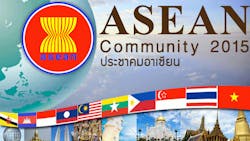US Companies Optimistic About Doing Business in Thailand
As 2015 and the establishment of the ASEAN Economic Community (AEC) approaches, U.S. companies are keeping an eye on opportunities offered by the regional economic integration.
Most respondents to a survey, released late last month by the U.S. Chamber of Commerce and the American Chambers of Commerce in ASEAN member countries, don’t believe that the goals of the AEC will be reached until 2020 or later. However, three quarters of the respondents in Thailand indicate that their company’s level of trade and investment in ASEAN has increased in the past two years.
The survey indicates that even more expect this trend to continue in the next five years.
Overall, 78% of business executives based in Thailand regard ASEAN integration as important to helping their companies do business in the region.
“Thailand’s economic fundamentals are strong and our members report that it’s ‘business as usual’ for them and they are going forward with their expansion plans,” said Darren Buckley, president of AMCHAM’s Board of Governors, attending the ASEAN Economic Ministers Meeting held on August 25 in Nay Pyi Taw, Myanmar.
“As the political situation stabilizes, businesses are experiencing higher degrees of optimism and foreign investors’ confidence return," Buckley added.
More on ASEAN
Respondents in Thailand have a positive outlook on the current business climate with the majority not facing significant financing constraints nor seeing higher cost of borrowing.
Business expansion remains high with 62% of the respondents saying they expect their companies in Thailand to expand, a dip since last year’s 75%, but the profit outlook remains strong with 82% expecting increased profits.
Things are not entirely rosy however as government responsiveness and engagement (or lack thereof) remains a detriment to business with 45% of Thai respondents reporting that the government rarely or never seeks and considers input from the private sector.
In particular all locations most frequently cite customs departments as the government agency with which they have the greatest levels of dissatisfaction.
And of course there are still concerns about the stability of the government and political system, which is an issue for 80% of respondents, and corruption (78%).
